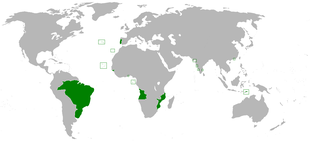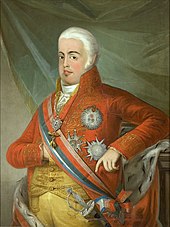United Kingdom of Portugal, Brazil and the Algarve
| Reino Unido de Portugal, Brasil e Algarves | |||||
| United Kingdom of Portugal, Brazil and the Algarve | |||||
| 1815-1822 / 25 | |||||
|
|||||
| Official language | Portuguese | ||||
| Capital |
Rio de Janeiro (1815–1821) Lisbon (1821–1822 / 25) |
||||
| Form of government |
Absolute Monarchy (1815-1820) Constitutional Monarchy (1820-1822 / 25) |
||||
| Head of state , also head of government | King Maria I (1815–1816) John VI. (1816–1822 / 25) |
||||
| currency | Portuguese real | ||||
| The United Kingdom of Portugal, Brazil and the Algarve and its colonies | |||||
The United Kingdom of Portugal, Brazil and the Algarves ( Portuguese Reino Unido de Portugal, Brasil e Algarves ) was a state on the territory of the present-day republics of Brazil and Portugal . It existed from 1815 to 1822 and 1825 respectively. Queen Maria I. and King Johann VI. came from the House of Braganza . The United Kingdom was made up of the titular kingdoms of Portugal , Brazil and the Algarve with equal rights , and had colonies on four continents. After Brazil gained independence , the United Kingdom was replaced by the Kingdom of Portugal.
prehistory
In 1807 Napoleon Bonaparte invaded Portugal to force the last European ally of the United Kingdom under the continental barrier established in 1806 . France and Spain signed the Treaty of Fontainebleau on October 27, 1807 , in which they decided to conquer and partition Portugal. Spain granted Napoleon's troops the right to march through so that they could reach Portugal by land. On November 29, 1807, the Portuguese royal family set out by sea to Brazil, and on November 30, 1807, Napoleon took Lisbon without a fight.
The ruling family reached Rio de Janeiro in 1808 , which from then on became the capital of the Kingdom of Portugal. The city gained in importance and its population grew.
After Napoleon's defeat on the Iberian Peninsula in 1813, calls for the return of the court to Lisbon became louder, while Prince Regent Peter did not want to leave Rio de Janeiro. The increase in importance of Rio de Janeiro made the royal family more popular. Nevertheless, voices increased that the capital should be moved back to Lisbon, as the kingdom could not be ruled from a colony. On the other hand, the Brazilians were of the opinion that Brazil should become an equal member so that the inhabitants would become citizens of equal value to the Portuguese. Brazilian nationalists supported the demand that Brazil should no longer subordinate itself to the interests of Portugal, but should be part of a transatlantic monarchy.
development
After the final defeat of Napoleon, the colony of Brazil was raised to the rank of kingdom by law by Prince Regent Peter on December 16, 1815, and the kingdoms of Portugal, Brazil and the Algarve were combined into a single state, the United Kingdom of Portugal, Brazil and the Algarve . The title referred to the historic Kingdom of Algarve , which existed on the territory of what is now the Portuguese region of Algarve and was administered de facto like a province of Portugal, and included claims to the Algarve across the sea in what is now Morocco .
With the establishment of the United Kingdom, the royal title was changed. The title of the Queen and the Prince Regent were changed to "Queen" and "Prince Regent of the United Kingdom of Portugal, Brazil and the Algarve" respectively, and the title "Prince of Brazil" of the heir to the throne of the Portuguese crown became "Crown Prince of the United Kingdom" in 1817 of Portugal, Brazil and the Algarve ”changed.
On March 20, 1816 Maria I died in Rio de Janeiro and Crown Prince and Prince Regent Johann was given the Portuguese number sequence as Johann VI. crowned second monarch of the United Kingdom.
After the Liberal Revolution of 1821/1822 , John VI left. Brazil, returned to Lisbon, leaving his son and heir to the throne Peter in Rio de Janeiro, who took over the government of Brazil.
During the Liberal Revolution, the Cortes gathered in Lisbon to give the kingdom a new constitution. The assemblies of the estates consisted mainly of Portuguese , as the delegates were mainly elected from Portugal, the country of origin of the revolution. A Brazilian delegation was not elected until later because it arrived later to cross the Atlantic Ocean . In addition, because of the end of colonial rule, Brazilian representatives were often discriminated against by the Portuguese and the Brazilians were underrepresented in the Cortes. The Portuguese delegates tried to circumvent the autonomous government of the Kingdom of Brazil by subordinating the provinces to the joint government in Lisbon. However, the Brazilian Cortes refused to give their consent, which sparked the Brazilian independence movement .
On September 7, 1822, near São Paulo , Peter declared Brazil's independence in response to the decision of the Portuguese Cortes and made himself Emperor Peter I of Brazil. Portugal recognized Brazil's independence in August 1825 in the Treaty of Rio de Janeiro 1825 .
After the recognition of independent Brazil and the consequent end of the United Kingdom, John VI changed. the state name back to "Kingdom of Portugal", his title to "King of Portugal and the Algarves" and the title of the aspirant to the throne was henceforth "Crown Prince of Portugal".
Individual evidence
- ^ Henry Adams, Earl N. Harbert: History of the United States of America During the Administrations of Thomas Jefferson , pp . 1009-1010 . ISBN 0-940450-34-8 , accessed April 4, 2011.
- ^ The popular encyclopedia or 'Conversations Lexicon . London 1846 , accessed April 4, 2011.
literature
- António Henrique de Oliveira Marques : History of Portugal and the Portuguese Empire (= Kröner's pocket edition . Volume 385). Translated from the Portuguese by Michael von Killisch-Horn. Kröner, Stuttgart 2001, ISBN 3-520-38501-5 .
- Walther L. Bernecker, Horst Pietschmann: History of Portugal: From the late Middle Ages to the present. 2. update Ed., Beck, Munich 2008 ISBN 3-406-44756-2 .
- James Maxwell Anderson: The History of Portugal . Greenwood Publishing Group, 2000 ISBN 0-313-31106-4
- Martins Oliveira: Histoire du Portugal. La Différence, Paris 1994, traduit du portugais par Claire Cayron, ISBN 2-7291-1021-6 .
Web links
- The Monarchy in Brazil Brazilian Ministry of Foreign Affairs (English)
- Elevação do Brasil a Reino Unido a Portugal e Algarves Education Secretary of Rio de Janeiro (Brazilian Portuguese)
- Reino Unido (1815-1822) , A História da Câmara dos Deputados , Timeline of the House of Representatives of Brazil (Brazilian Portuguese)
- Colonial Flags of Brazil (English)




